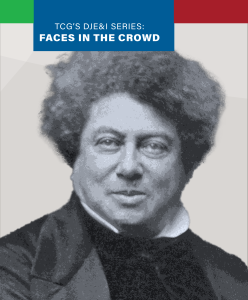 For Black History Month, TCG’s series “Faces in the Crowd” is highlighting an author whose literary genius was so impactful that his work prevailed over stigmas of race and class. His imagination and creative storytelling were so powerful that they captured the spirit of transformative thoughts and ideas and changed the world.
For Black History Month, TCG’s series “Faces in the Crowd” is highlighting an author whose literary genius was so impactful that his work prevailed over stigmas of race and class. His imagination and creative storytelling were so powerful that they captured the spirit of transformative thoughts and ideas and changed the world.
Alexandre Dumas (1802–1870) was a French literary titan who, despite being constantly confronted with discrimination, became a household name of the 19th century. The Three Musketeers and The Count of Monte Cristo have long been deemed “classics” and were, once upon a time, even required reading for children. These books and others he wrote have left an indelible mark on literature and in the world in general.
The grandson of a French nobleman and an African slave, Dumas is credited with well over 40 novels, which have been adapted into nearly 200 films and translated into more than 100 languages. A mixed-race child of African and Haitian/French ancestry became one of the foremost authors of all time.
Alexandre Dumas was born Dumas Davy de la Pailleterie in Villers-Cotterêts, France, to Marie Louise Labouret and General Thomas-Alexandre Davy de la Pailleterie. The Dumas family name was adopted from Alexandre’s grandmother, an enslaved Haitian woman named Marie-Césette Dumas. His grandfather was the Marquis Alexandre Antoine Davy de La Pailleterie, who purchased Marie-Cesette while in Saint Domingue, now Haiti.
Shortly before he returned to France, Alexandre’s grandfather sold his grandmother and their two daughters (Adolphe and Jeanette). He retained ownership of Alexandre’s father, Thomas-Alexandre, and took him to France. There, Thomas-Alexandre received his freedom and an education at a military school, adequate to enable him to join the French army. The path to the military was the best option because it was unthinkable that a mixed-race child could be his father’s heir. Thomas-Alexandre did well in the Army and was promoted to general by the age of 31, the first soldier of Afro-Antilles origin to reach that rank in the French army. He married Marie Louise Labouret, who gave birth to Alexandre in 1802.
Like so many authors, Dumas was not afforded the time to write through some generous patronage of the arts. He worked initially as a notary and then as a Secretary to the Duke of Orleans, who later became French King Louis Philippe. Simultaneously, Dumas immersed himself in literature and literary circles. His prolific career started with writing a number of plays — both comedies and dramas. He wrote for magazines and wrote a vast collection of travel books and cookbooks. From there, Dumas’s career flourished, and he is credited with well over 40 novels.
In 2002 (the bicentenary date of his birth), French President Jacques Chirac held a ceremony honoring the author by having his ashes interred at the mausoleum of the Pantheon, where numerous other French luminaries are buried. This ceremony was performed with great pomp and circumstance — an exquisite coffin draped in a blue velvet cloth and carried on a caisson flanked by four mounted Republican Guards, thus symbolizing the four Musketeers; and the event was nationally televised. During the ceremony, President Chirac acknowledged for the first time the racism that Dumas had to contend with, and that continues to exist in France.